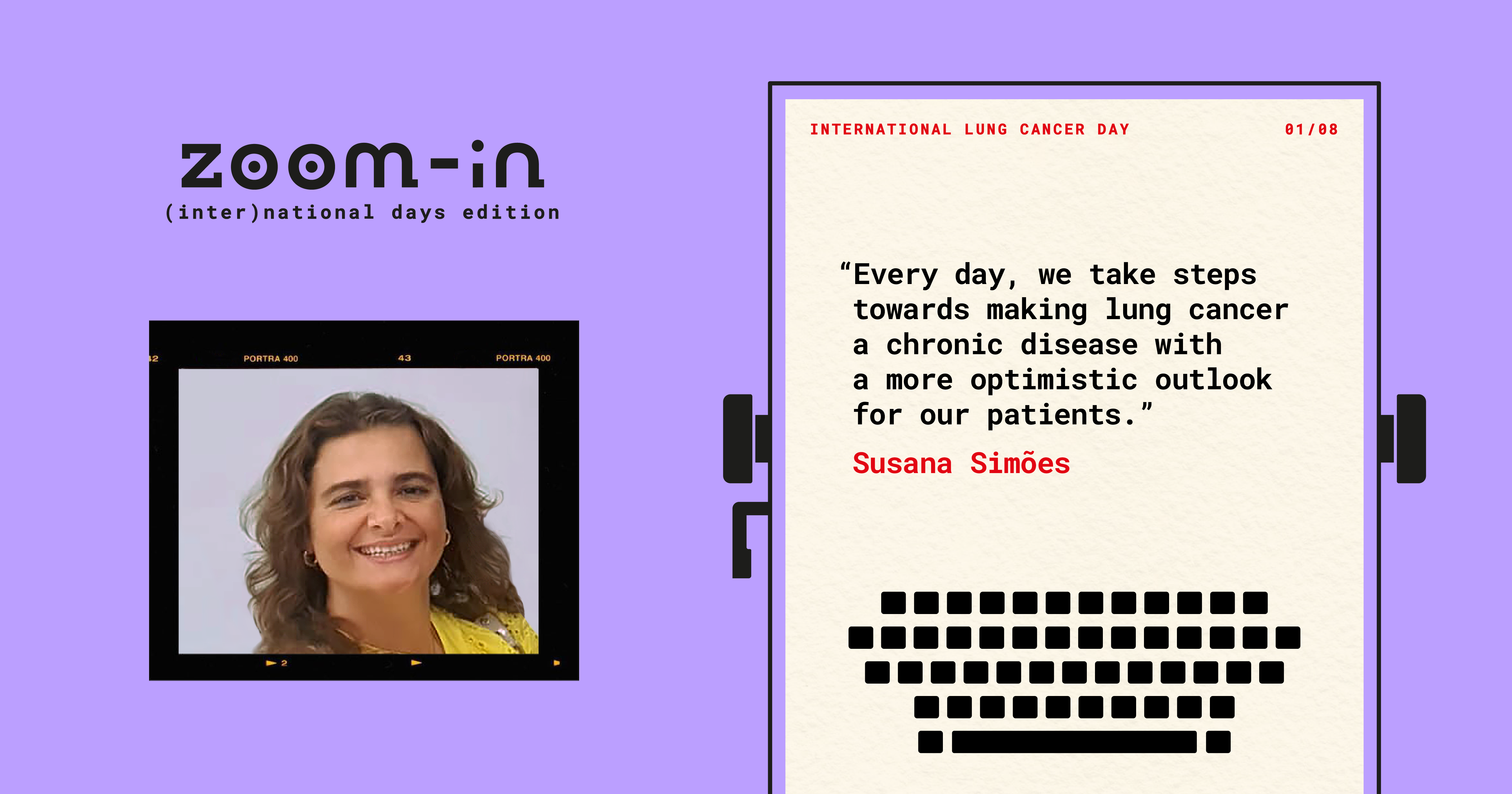Since 2012, August 1 has been designated as World Lung Cancer Day. The international lung health community uses the day to raise awareness and spread information about the disease’s risk factors, symptoms, diagnosis and treatment.
Dr. Susana Simões, of the Champalimaud Foundation’s Lung Unit, joined us for a conversation about this disease, which is responsible for more cancer deaths than any other.
Susana is a pulmonologist dedicated to lung cancer diagnosis and treatment, to smoking prevention and control and also to smoke cessation treatment. She is currently collaborating on several lung cancer clinical trials and is a PhD student at Nova Medical School.
August 1 is World Lung Cancer Day, with one of the main goals being to raise awareness of this disease. What would you say are the key aspects of lung cancer (and avoiding it) for people to be aware of?
Lung cancer, according to the World Health Organisation, is the second most common cancer worldwide and is the number one cause of cancer mortality.
There is a close and well-documented connection to tobacco use, which is one of the leading risk factors for lung cancer, but it is overly simplistic to say this is the only consideration. In fact, the vast majority of long-term smokers will never have lung cancer. Risk of lung cancer is lowest in those who have never smoked, but incidence amongst this population is worryingly on the increase, especially for women. Other factors, such as family history, lifestyle and exposure to certain carcinogens and other environmental chemicals (especially asbestos) can also affect the likelihood of developing the disease.
As with most cancers, early diagnosis is crucial. The relatively low survival rate for lung cancer patients reflects the large percentage of locally advanced or metastatic diseases diagnosed (75%) and in these stages, 5-year survival is 6%, whereas in more localised disease it is approximately 60%. This means that the earlier the disease can be detected, the better chance the patient has of surviving. Delay in diagnosing lung cancer is recognised as an important impact factor on the overall result of the treatment of this disease because it’s a silent disease, often showing no symptoms until late in its development. This is why we would welcome a population-based screening programme of low-dose CT scans for high-risk individuals.
For these reasons, the main goal of World Lung Cancer Day is to raise awareness in order to reduce lung cancer mortality through programmes aimed at educating the population about this disease, while encouraging health professionals, namely in primary health care, to be more aware of the clinical criteria for screening and early diagnosis.
For those who have been diagnosed with Lung Cancer, what general advice would you give to them, and their families?
The first thing I would say is that a lung cancer diagnosis is not a death sentence. Treatment options are improving and growing all the time, with targeted therapy, immunotherapy and radiotherapy becoming available, to different degrees.
There are also many clinical trials taking place, so be open minded: there could be an excellent opportunity to access promising, innovative treatments that are not yet available in routine clinical practice. Speak to your clinician for more information about clinical trials that may be suitable for you.
Lastly, but equally important: take care of yourself. Try to maintain a healthy lifestyle, avoid tobacco ( which impacts treatment effectiveness) and exercise regularly. And remember to focus on your mental health, too. A lung cancer diagnosis, like any serious medical condition, can cause a lot of stress and anxiety, so remember to do things that you enjoy. Spend time with friends and family, switch off the news…!
You briefly mentioned treatment in the previous question. Could you give a little more information about some of the treatment options for lung cancer patients?
In the last few years, there has been rapid development in the treatment approach to lung cancer. Probably the easiest way to explain this is to consider the two main groups of the disease and their respective treatment goals.
The first group covers localised disease which is confined to one lung with or without the involvement of lymph nodes on the same side. In these cases, the intent of the treatment is curative and that's why it's imperative to raise awareness of this disease as an attempt to reduce its overall mortality. In localised tumours, the treatment relies on local therapeutic approaches (surgery or radiotherapy), associated, or not (before, during or after), with systemic treatment depending on the local extent of the disease with the goal to better control the risk of relapse.
In the second lung cancer group, the disease has already spread beyond the initial lung and presents secondary lesions (metastases) in other organs, including the other lung. When the disease has this systemic extension, the whole body has to be treated and the localised treatments are insufficient to control the evolution of the disease. The goal of the treatment is disease control that allows the patient to maintain quality of life. One of the great evolutions in the treatment of lung cancer has been developed to aid this group of patients, as current treatment increasingly moves away from chemotherapy as the only go-to option. In fact, for the great majority of tumours, the treatment will be chosen based on tumour cell characteristics and their genetic profile, making lung cancer treatment increasingly personalised.
With the results of these new therapeutic strategies, it is already possible in many cases to see a longer and better quality of life. Every day, we take steps towards making lung cancer a chronic disease with a more optimistic outlook for our patients.
Is the Lung Unit doing anything to commemorate World Lung Cancer Day 2023?
It’s not specifically to commemorate World Lung Cancer Day, but the timing is more than just a coincidence as we have just announced a series of meetings about this disease. The first round of ‘Lung Cancer Fight Club’ will take place on the 22 September 2023, and the main objective of this meeting is to reinforce the message that lung cancer can be a preventable, traceable and curable disease, and therefore a concerted and collaborative effort must be made in the implementation of public health policies and interventions.
*For more information about Lung Cancer Fight Club, consult our website here.
Edited by John Lee, Content Developer of the Champalimaud Foundation Communication, Events and Outreach team.



